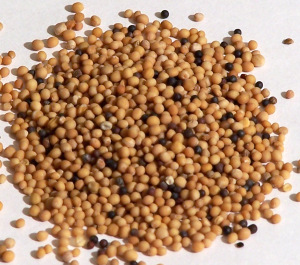In a rare Biblical occurrence, the mustard seed parable is given on two separate occasions. The first time it was given took place between the second (28 A.D.) and third (29 A.D.) Passover seasons of Jesus' ministry (Matthew 13:31 - 32, Mark 4:30 - 32). The second time it was recorded it was offered in late 29 A.D. as the Lord was making his way toward Jerusalem to keep the Feast of Lights or Hanukkah (Luke 13:18 - 19).
This parable was first given while the Lord preached from a ship to a large crowd of people on the shore. He said to the crowd the following.
"The kingdom of heaven is compared to a tiny mustard seed which a man took and sowed in his field; Which indeed is very small . . . but after it is grown, it is greater than all the herbs, and becomes a tree . . ." (Matthew 13:31 - 32, HBFV).
Was It the Smallest Seed?
Technically speaking, the world's smallest seed is not the mustard but that of the orchid plant. Some people have jumped to the conclusion that Jesus must have made an error when he labeled it the smallest. Part of the problem lies in the KJV's translation which says it was "the least" (Matthew 31:32, KJV). A more accurate translation states it was "very small" or among the smallest.

" . . . it is sufficient to know that 'small as a grain of mustard seed' was a proverbial expression among the Jews for something exceedingly minute" (Basic Theology, section 14, Problem Passages).
"The rabbis called the smallest possible quantity 'the quantity of a grain of mustard,' and Mahomet uses the same expression in the Koran" (A Commentary on the Holy Bible, comments on Matthew 13).
This parable contrasts the very small size of a seed with the tremendous results it produces. Likewise, the Kingdom of God will begin small, with just a few people now being called and converted in this age. However, it will grow to immense proportions as people are resurrected and learn to live God's way.
Meaning of the Parable
When Jesus finished giving his Kingdom teachings, including the mustard parable, he told his disciples, "'Have you understood all these things?' They said to Him, "Yes, Lord." Then He said to them, 'Therefore, every scribe who has been instructed in the kingdom of heaven is like a man who is a householder, who brings forth out of his treasure things new and old'" (Matthew 13:51 - 52).
What is the treasure that brings forth things old and new? It is the truth of God's word in both the Old and New Testaments. When a householder brings out some of his treasures he does not simply show them to his children, but distributes it to them. Christ put the responsibility on his disciples to teach about the treasures of the kingdom to others.
One final thought regarding this mustard seed parable. Do not waste time debating whether the plant produces a bush or a tree. In arguing such things, people miss the entire meaning of the teaching.